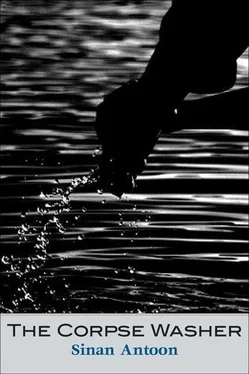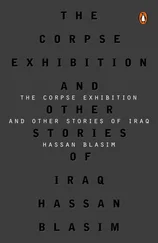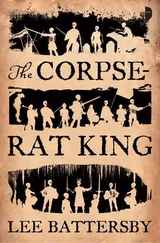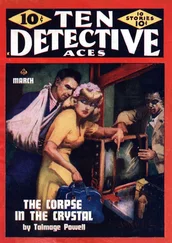My sister and her husband, Sattar, had moved to a new house he’d bought in Karrada. It was the fruit of his agility in riding the new wave, just as he had ridden the previous one under Saddam. Her husband was a “comrade” in the past, and he had kept defending the ancien régime and its policies vigorously even in its last few years. Sattar and my father once had a terrible argument. Sattar left our house and swore never to set foot in it again. He only did so after my father’s death. Although he had forced my sister to stay away from the family, she would still visit from time to time. My father’s death finally patched things up. I’d never liked Sattar and had had doubts about him during their engagement, but she loved him and he treated her well.
We got lost in al-Karrada’s streets with its big houses. I called my sister on the cell phone to get directions, repeating everything she said to the taxi driver. She said she was going to stand outside to wave when she saw us. I spotted her in a side street ten minutes later and told the driver to back up to that street. I asked him to wait for me while I said goodbye, but my mother objected: “Why are you in such a hurry?” My sister also chastised me for not having visited her new house or seen her kids in months. I hesitated and looked at the garage. Her husband’s car was not there. As if sensing what I was thinking, she reassured me, “Come on. Come on in. Let’s get enough of you before you leave. Sattar isn’t home and won’t be back until later tonight, and the kids are in school.” I paid the taxi driver and we all went in.
Their house had a big garden. The lawn was neatly trimmed and framed by flowers on all sides. I spotted some carnations. The palm tree’s fronds in the far right corner were touching a window on the second floor. Its bunches were full of dates. A white metal table, surrounded by four chairs, sat on the white and yellow marble of the walkway in front of the house. We went in through the kitchen door. My sister had put plenty of flowerpots by the window and filled them with the cactus plants she loved. The house had been recently built. It had five bedrooms, three bathrooms, and a huge living room. My sister had prepared one of the bedrooms on the ground floor close to the bathroom for my mother to sleep in. That way she wouldn’t have to strain her knees going up and down the stairs.
“Look how beautiful your room is,” my sister said proudly, and I felt she was addressing me as well. My mother kissed her on the cheek and thanked her. I put Mom’s suitcase next to her new bed. The room had a medium-sized cupboard and a huge mirror and two red chairs, one in front of the mirror and the other next to a TV table. Above the TV, the room’s only window overlooked the neighbor’s garden.
“I’m making okra stew. I know you love it. Why don’t you stay?” my sister said. “It’ll be ready in an hour.”
“I have a few appointments and have to be somewhere. I’ll have tea.”
“Tea it shall be.”
She took us to the living room and I sat down. The TV was turned to one of the local satellite channels and was showing the gory aftermath of a suicide bombing in al-Karkh that had taken place half an hour before. We had left Mother in her room unpacking. Minutes later she came and sat next to me and said she would finish settling in later. “I want to get enough of you.”
My sister came back with a tray full of cookies and some plates and forks, putting it on the big table in the middle. She pulled a smaller table from under it and put it in front of me. She put two cookies on a plate and put it on the table in front of me. She looked at the TV screen and said, “Ah, when will these suicide bombers leave us alone? Haven’t they had enough?” Mom invoked God and put her hand on her cheek.
The images of scattered body parts and pools of blood reminded me of what I was escaping, but I couldn’t avoid thinking of the fate of these corpses. Who would wash them and shroud them? I asked my sister to change the channel. She handed me the remote and went to the kitchen to check on the tea. I kept turning the channels until I found one showing a nature documentary with birds. I bit into one of the cookies.
The TV was on the middle shelf of a huge entertainment center made of Indian oak. On some of the shelves were china and crystal. Another bore some books, but I couldn’t see their titles. The shelf right above the TV had framed pictures of my nephew and niece, Maysam and Muthanna, a family photo, and then a photo of the head of the household, wearing a suit and a tie, shaking hands and smiling with one of the ministers. I remembered their old house, with a much smaller TV, and on top a framed photo of Sattar and some of his comrades with Saddam. Saddam had rewarded him for his loyalty during his years of service to the Ba’th Party. I wondered what Sattar had done with that photo. Had it been fed to the fire, or was it hiding in a box somewhere in case a new strategic change might be needed in the future?
My sister brought in the teapot. I was about to ask her about this new loyalty, but why say goodbye with an argument? It was strange that the de-Ba’thification Law didn’t apply to Sattar, even though it had affected so many others. My sister poured the tea and put one spoon of sugar in the cup for me. I could smell the cardamom.
My mother asked her about Sattar and his health.
She answered that he was well, but always busy and coming home late. He was traveling to Turkey for work and she and the kids had been sleeping at his family’s house for safety, but the new house was in a very safe area.
My sister asked me about the mghaysil and what I’d decided to do with it.
I told her I had agreed to lease it to al-Fartusi, who would hire someone to work there.
Mom put down her cup and started to wipe away tears. She repeated what had become a mantra in these recent weeks: “But where will you go, son?”
When she started sobbing, I decided that it was time to leave. My heart almost stopped when she held on to me as if she knew it would be the last time she would see me.
“You all went away and left me. I’m gonna die before I see you again,” she said, her words soaked in tears.
My sister was offended: “What’s this, Mom? Don’t I count? God forgive you.” My sister hugged and kissed me. She shed a few tears, but reassured me, saying, “Don’t worry about her at all.”
My mother insisted on sprinkling water as I was leaving, a charm supposed to guarantee my return. She kept repeating, “Call us when you get there.” I waved to them both and had a feeling that maybe she was right: I might not see her again for a long time, maybe ever.
I couldn’t identify the feelings that overtook me after I left. After the sadness I felt as I was saying goodbye to them, I was overtaken by guilt toward my mother, but I also thought of the dead. Who would wash them now?
When we arrived at the Traybeel Center on the Iraqi side of the border, we joined a long line of parked cars. Many passengers had gotten out and sat or squatted nearby. As our convoy took its place, the driver said that the line was normal; it might take a few hours, especially since there had been explosions in Jordan recently. He got out of the car and went to chat with other drivers who had gathered. I got out to stretch. The last time we’d stopped was five hours before. The man in the back seat got out and started walking on the shoulder of the road, holding his worry beads. His beads had kept ticking throughout the trip, reminding me of my father.
I noticed that every now and then a few cars headed back in the opposite direction, toward Baghdad. After about half an hour the line started to move. Our driver got in and inched forward. He motioned to me to get in, but I told him that I was going to walk. The line stopped after a few minutes. I told the driver that I was going to keep walking ahead. He took a drag on his cigarette and said, “Sure, just don’t get lost.”
Читать дальше












